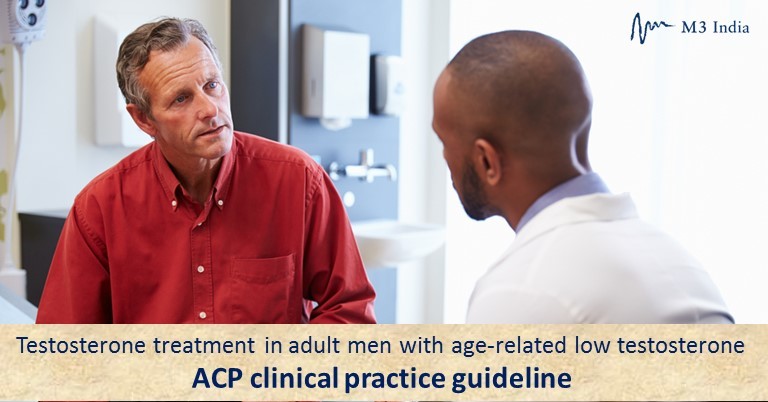Testosterone treatment in adult men with age-related low testosterone: ACP clinical practice guideline
M3 India Newsdesk Apr 09, 2020
The American College of Physicians (ACP) recent evidence-based clinical practice guideline provides recommendations based on the evidence on the benefits, harms, and costs of testosterone treatment in adult men with age-related low testosterone.
For our comprehensive coverage and latest updates on COVID-19 click here.
 As per a recent evidence-based clinical practice guideline by the American College of Physicians (ACP), testosterone should be prescribed for men with age-related low testosterone only to treat sexual dysfunction. The decision to initiate testosterone treatment should be based on the potential benefits, harms, costs, and patient preferences. The guidelines also mention that clinicians should re-evaluate symptoms within 12 months and periodically after that.
As per a recent evidence-based clinical practice guideline by the American College of Physicians (ACP), testosterone should be prescribed for men with age-related low testosterone only to treat sexual dysfunction. The decision to initiate testosterone treatment should be based on the potential benefits, harms, costs, and patient preferences. The guidelines also mention that clinicians should re-evaluate symptoms within 12 months and periodically after that.
In most men, there is a slow decline in serum total testosterone levels with aging, even in the absence of disease. Age-associated decrease in serum total testosterone levels (testosterone threshold, ≤10.4 nmol/L [300 ng/dL]) initiates in men in their mid-30s and progresses gradually at an average rate of 1.6% per year. Age-related low testosterone presents with clinical symptoms of androgen deficiency.
The American College of Physicians (ACP) guideline provides recommendations based on the evidence on the benefits, harms, and costs of testosterone treatment in adult men with age-related low testosterone.
Treatment initiation should involve a shared decision between the clinician and the patient
Recommendation: ACP suggests that clinicians discuss whether to initiate testosterone treatment in men with age-related low testosterone with sexual dysfunction who want to improve sexual function. The discussion should include the potential benefits, harms, costs, and patient's preferences.
Testosterone treatment in men with age-related low testosterone may show small improvements in sexual functioning, as measured by the Aging Males' Symptoms (AMS) scale, International Index of Erectile Function (IIEF) erectile dysfunction domain, or IIEF-5 (simplified 5-item IIEF) scale. However, there is negligible data to support the use of testosterone in improving physical function, depressive symptoms, energy, and vitality, or cognition.
Evidence supporting improved quality of life with testosterone is limited to results from the AMS scale; improvements in sexual function probably drive the small improvements in quality of life.
Variability in patient values and preferences have been observed with testosterone therapy; hence, the panel does not support the use of testosterone treatment in all patients with age-related low testosterone without informed decision making.
Recommendation: ACP suggests that clinicians should re-evaluate symptoms within 12 months and periodically thereafter. Clinicians should discontinue testosterone treatment in men with age-related low testosterone with sexual dysfunction in whom there is no improvement in sexual function (conditional recommendation; low-certainty evidence).
The majority of the studies which evaluated the role of testosterone treatment included a follow-up period of 12 months or less; hence, the longer-term benefits and harms of testosterone treatment are currently unknown.
In patients who do not show symptom improvement with testosterone treatment, continuing the treatment would add additional expenses to the patient. Thus, patients' symptoms should be re-evaluated to test if the treatment is effective; if no benefit in sexual function occurs within 12 months, the panel suggest the treatment to be discontinued.
Recommendation: ACP suggests that clinicians consider intramuscular rather than transdermal formulations when initiating testosterone treatment to improve sexual function in men with age-related low testosterone, as costs are considerably lower for the intramuscular formulation and clinical effectiveness and harms are similar.
Studies comparing intramuscular and transdermal testosterone formulations have found no considerable differences between the two with respect to effectiveness, benefits, or harms. Both intramuscular and transdermal testosterone applications lead to improvements in sexual function. Cost is an important factor, with more patients preferring the intramuscular formulation over transdermal applications because of a lower price.
Recommendation: ACP suggests that clinicians not initiate testosterone treatment in men with age-related low testosterone to improve energy, vitality, physical function, or cognition.
Given the limited/negligible evidence, testosterone is not recommended for concerns such as aging, including energy and vitality, physical function, and cognition. The lack of evidence on long-term harm further supports this recommendation.
Though some studies report a decrease in mortality with testosterone treatment, the panel concluded that evidence is insufficient to draw definitive conclusions about the effect of testosterone treatment on mortality. Therefore, men with age-related low testosterone should not be prescribed testosterone treatment unless its purpose is to treat sexual function issues.
-
Exclusive Write-ups & Webinars by KOLs
-
Daily Quiz by specialty
-
Paid Market Research Surveys
-
Case discussions, News & Journals' summaries